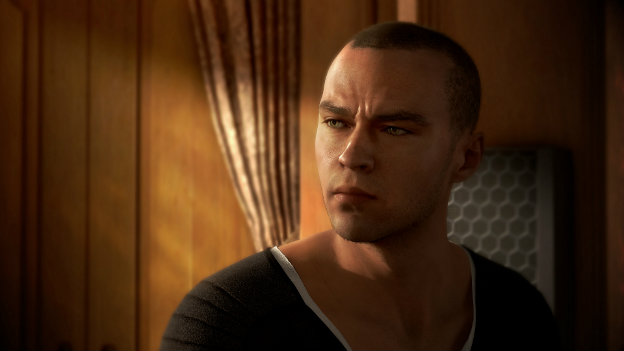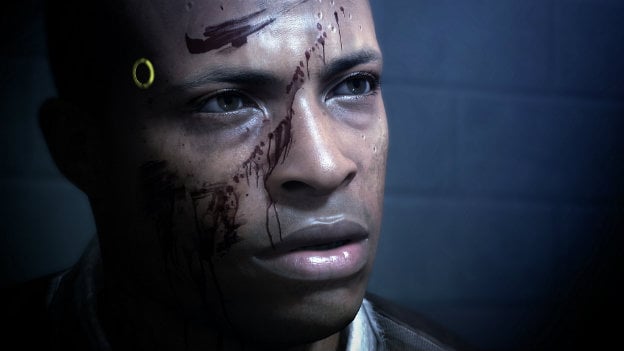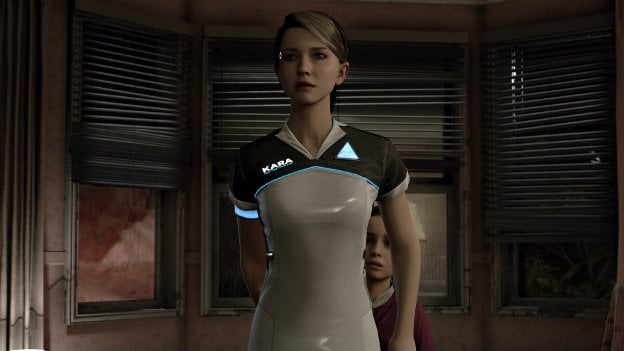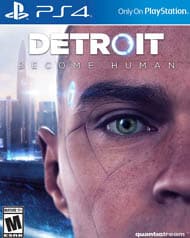Exploring the Human Side of Artificial Life
As a developer, Quantic Dream is known for being controversial and polarizing. This is due to allegations being applied to its leaders, like David Cage. Sometimes, this bleeds over into their games, with Heavy Rain criticized for its sexism and Beyond: Two Souls for its use of stereotypes. Like its predecessors, Detroit: Become Human does not shy away from serious, touchy subjects. This may impact some people’s enjoyment or even act as triggers for unpleasant memories. For others who find themselves prepared for this game, they will find an experience that mostly learns from Quantic Dream’s prior pitfalls.
Detroit: Become Human is a story that questions the validity and authenticity of artificial life by watching critical moments in the lives of three androids. One is Connor, one of the most advanced androids in the world, working alongside a human detective, Lt. Hank Anderson, to investigate androids that are defying their programming and engaging in criminal acts. Kara is a household android owned by a drug addict who is, at the very least, verbally abusing his daughter Alice and has attacked Kara before. Markus is another android caretaker who acts as an aid for a disabled, famous artist. These stories can overlap and intertwine, with Connor, Kara, and Markus’ actions determining the way those important to them and society sees them and androids in general.
In terms of storytelling, I felt like Detroit: Become Human could be rather inconsistent. It was almost like one person wrote the Connor and Markus routes, which are compelling, have genuinely interesting twists, and depict relationships that I actually cared about, while someone less capable tackled Kara’s story. I was more regularly seeing how my decisions impacted not only these androids’ lives, but the lives of those around them with Connor and Markus. Meanwhile, Kara’s storyline seems very stereotypical and contrived. It was uninteresting, and I was able to pick up on one of its biggest plot twists long before another character foreshadowed it. There is a subtleness and lack of momentum there that seems inconsistent with the things I was learning and doing with Connor and Markus.
This extended to Detroit: Become Human ’s more scandalous moments. The plight of the androids is a heavy-handed parallel to slavery in North America. But while the more extreme moments of assault, enslavement, racism, and sexual abuse are employed in ways that make sense or are occasionally approached with some degree of tact in Connor and Markus’ routes, Kara’s instances seem executed as a cheap emotional pull or for shock value. They feel forced. It was like Kara and Alice were floating along from one terrible situation to another as emotional exploitation, to the point where it had the opposite of the intended effect on me as I played. I cared more about similar situations in Connor and Markus’ stories and had more empathy for the victims there.
It also carries over to the acting. There are some great performances in Detroit: Become Human . Jesse Williams and Bryan Dechart knock it out of the park as Markus and Connor, with each one showing their characters evolving as a result of encounters and choices people make. Clancy Brown plays the grizzled, depressed Lt. Anderson well. There are times when Minka Kelly’s disgust, as North, is palpable. But for me, others fell short. Valorie Curry, as Kara, came across as very bland and unmemorable. Her performance struck me as robotic, which is ironic considering the push to make her seem so human in marketing materials.

What I will say is that the representation is much better in Detroit: Become Human . While some characters in Kara’s route hold stereotypical roles, I was pleased to see how diverse this game is. We see people of all different skin tones and races, regardless of whether they are human or android. It is quite a change from Beyond: Two Souls and Heavy Rain , which were filled with Caucasian characters. As a result, Detroit: Become Human feels more realistic and plausible, like this could be happening in our world. This is important, given how futuristic its premise is.

As uneven as the storytelling may be, Detroit: Become Human learns from past Quantic Dreams by offering more genuine choices. There are lots of varying factors in each story, with characters doing or learning things that do impact the plot. Characters will return at different points, remembering what you have or haven’t done. Things that you have noticed open up dialogue options and story paths. Even more beneficial is a flowchart that unlocks after each segment. You can see what you did, comparing those actions to the responses of your friends and the world. It lets you see the element of choice in action, even if some segments only have one possible outcome, and know that there will definitely be major variations depending on what has occurred.
The way the choices affect the story immediately is as impressive as Detroit: Become Human ’s more distant endings. There are many instances, both during more subtle, quieter moments and active chases, where the androids’ actions provide an instant satisfactory or devastating response. Two hit me hard in particular. One took place during one of Connor’s investigations. I was told he could head to an area to gain additional information on what happened involving some deviant androids. I did not finish my exploration of the space he was in previously, because I assumed I could return. Something happened there that forced the course of events down a different route. In another instance with Markus, I chose to have him forcibly engage in an amorous act with another android, not considering her feelings, as a cover. It was an impulse button push with seconds to spare. It drastically altered her opinion of him and made me feel terrible in the process.
Speaking of actions, Detroit: Become Human is still a game where it looks amazing. Which is great! The design is on point. But, that means it feels like quite a let down when characters’ movements are not as natural as their appearances. There are halting, jerky actions. People might not move as precisely as you would like. Getting the camera to react quickly when turning can occasionally be troublesome. While this is forgivable in some situations, there are more than a few times when the game puts you on a deadline.

Characters engage in chases, where you need precise movements, have to quickly pull up options by pressing the right trigger, and make decisions. Timers will appear giving you minutes, sometimes even seconds, to make a decision. In one Kara segment, the troublesome camera, faulty movement, and the clock all came together to keep me from having her grab something an opponent chasing her would use against her. It can be frustrating.
Detroit: Become Human is a game that can be rather difficult to classify. It usually improves upon the forms of storytelling and gameplay found in Heavy Rain and Beyond: Two Souls , though character movements can still be frustrating and some stories are better than others. It still relies on sensational concepts and topics to get reactions from an audience, with some androids’ routes more effectively and tactfully employing them than others. It is a more diverse game, both in terms of the kinds of characters displayed and the sorts of choices people can make. Quantic Dream’s formula is evolving, even if it does rely on some of the same crutches.
RATING OUT OF 5 RATING DESCRIPTION 5.0 Graphics
The characters in Detroit: Become Human are some of the most realistic you will see on the PlayStation 4. 3.8 Control
There are times when the camera and controls fight with you, which is incredibly frustrating during moments where every second counts, but things are usually manageable. 4.7 Music / Sound FX / Voice Acting
Most of the voice acting is on point, but a few of the performers do not do a good job of bringing their artificial counterparts to life. 4.8 Play Value
Choices actually matter in Detroit: Become Human, as evidenced by the in-game flowchart showing all possible options. I would say it would merit at least two playthroughs. 4.5 Overall Rating – Must Buy
Not an average. See Rating legend below for a final score breakdown.
| Review Rating Legend | |||
|---|---|---|---|
| 0.1 – 1.9 = Avoid | 2.5 – 2.9 = Average | 3.5 – 3.9 = Good | 4.5 – 4.9 = Must Buy |
| 2.0 – 2.4 = Poor | 3.0 – 3.4 = Fair | 4.0 – 4.4 = Great | 5.0 = The Best |
Game Features:
